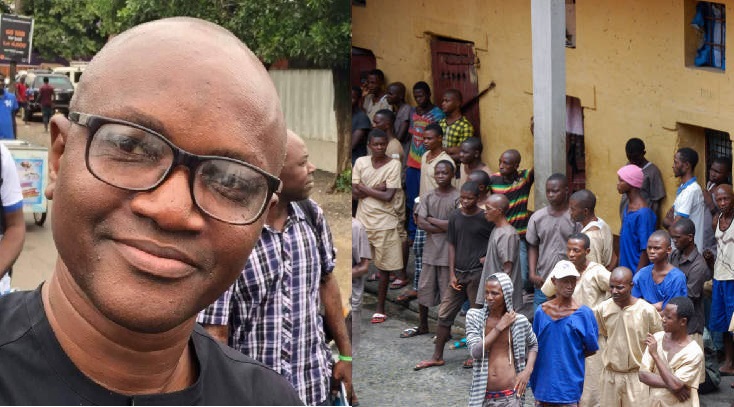The weeklong visit to Sierra Leone’s prisons by senior judges got off to a blistering start for Justice Nicolas Brown-Marke who is in charge of the north.
As part of efforts to decongest the country’s notoriously overcrowded jails as sanctioned by Chief Justice Babatunde Edwards, the Supreme Court Judge reviewed 28 cases on day one and considerably whittled down the sentences.
One by one he called out the prisoners, studied their casefiles and cross-examined them. He would later proceed to Mafanta on day two where he also reviewed dozens more.
The 28 inmates in Makeni had each received a five-year jail term with some having that reduced to a single day or a fine of Le 100,000 or Le 200,000 to walk free again.
They include an 18-year-old SSS 2 pupil who was convicted of stealing his father’s building materials. He was asked by Justice Brown-Marke to return to school. There was a 22-year-old who was convicted of stealing a Bluetooth earpiece, another 22-year-old who was also jailed for stealing a mobile phone valued at Le 200,000, a cleaner working for the University of Makeni who was jailed for stealing four plastic chairs at work. He said the chairs were later retrieved at his house, he was sacked, denied his benefits, yet charged and jailed for five years.
They all either had their sentences reduced to one day, one year or to pay between Le 100,000 and Le 200,000 and be set free.
Not surprisingly, they were ecstatic. One told Politico: “The judge has done very well for us. He has done a very great thing for us. That’s all I can say”.
Speaking to Politico in a mood that lacked equanimity, he said his brother had stolen some items, and he joined him to sell them. “I knew those who had bought the items so when the police came I identified them. My brother had fled. The police arrested me. We retrieved the items but they, nevertheless, brought me before the courts. I was sentenced to five years in jail, which has now been reduced to one day”.
Sounding and looking bewildered, another prisoner said: “I thank God…The judge says my five-year imprisonment has been reduced to just ONE SINGLE DAY. I am completely confused. I lodged some young men who stole someone’s mobile phone and fled. I was jailed for five years because I put them up. I am happy. I am very happy.”
Another who saluted the panel and sprinted into the lockup once his sentence was whittled down said he was elated. “I was very stressed up. Just for a Le 150,000 Bluetooth device I was sentenced to five years in prison. Now I am excited because that has now been reduced to either two years in prison or I pay Le 100,000. I am sure my relatives will pay, so I can return to school. My mother is dead. And my father, who is a foreigner, is out of the country”, he told Politico.
Another said: “I really feel happy today. Actually when I had this problem, I felt very discouraged. I feel happy that the state has looked into my case and my sentence has been reduced from five years to two years – or I am to pay a fine of Le 200,000. I am very happy”.
Many of the prisoners inside the Makeni prison, like elsewhere, do not have legal representation. The country’s legal aid board is under-resourced to cope.
Earlier Justice Nicolas Brown-Marke addressed the inmates from the courtyard. Some listened through the walls of their cells, peeping through the holes. Speaking to Politico later, he said all but one of the country’s prisons were overcrowded, with most of the inmates being “poor people”.
He said that while the ongoing exercise would decongest the prisons, a review of the country’s sentencing policy would be the real way to go. That, he said, would be promulgated this year.
The case reviews happened inside the Makeni central prison. A small courtyard surrounded by a block of five rooms, which are the holding facilities, a kitchen, a bakery and an outdoor pit latrine.
Inside the cells, mattresses lay on the floor on which the 189 inmates were crammed. Of that number, 109 were serving jail terms while the remaining 80 were being held on remand or awaiting indictment – a sore point that has been raised by rights activists who say the hiatus between a magistrate committing a matter to the high court and the indictee being brought before the court, is intolerably too long.
The yard itself was clean. But what would beguile you lay inside the cells. The walls looked bedaubed with some substance of some sort, while the rooms themselves were dark with poor ventilation. The prisoners looked healthy, apart from one who looked severely ill. He is a teacher who is serving a jail term for sexually penetrating his student, apparently a minor. The nurse said he was down with malaria and typhoid fever.
Rights groups have hailed the ongoing exercise, calling it “progressive and long overdue”.
The programmes coordinator of the Center for Accountability and Rule of Law (CARL), Jeremy John-Simbo said it showed the Chief Justice was a “listening” person. He said it was not only good for the liberty and rights of inmates, but was also economical for the state, which spends huge amounts of money looking after prisoners some of whose crimes were not commensurate to the cost of tending to them.




 Post a comment
Post a comment









